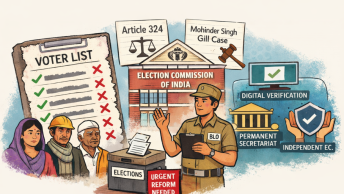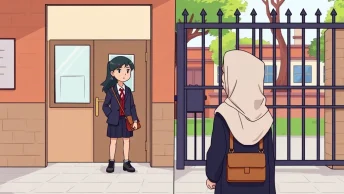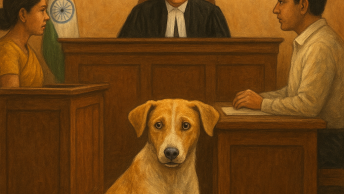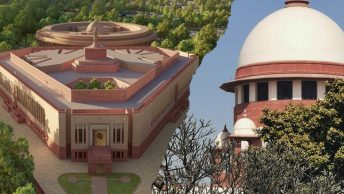This post is part of a series on constitutional and political questions relevant to contemporary times written by Sughosh Joshi, a political researcher working with I-PAC. Sughosh also publishes a weekly substack newsletter called ‘In the Matter of the Republic’, you can check it out here and subscribe to it for regular updates.
Summary: This post summarises what the various opinions in the Marriage Equality Judgment held on the issues raised by the petitioners.
A Constitution Bench of the Supreme Court of India (SC) on 17th October, 2023 pronounced a judgment in the case of Supriyo @ Supriya Chakraborty & Anr. v. Union of India. The case was about a bunch of petitions relating to same sex marriage, adoption by queer couples, etc. These petitions were originally before the Delhi High Court, Gujarat High Court and the Kerala High Court. The SC transferred all petitions before these High Courts to itself. This post shall discuss the judgment in the case.
The bench of five judges, Chief Justice (CJ) Chandrachud and Justices (JJ) Kaul, Bhat, Kohli and Narsimha pronounced the judgment after hearings concluded in May this year. There were four separate opinions – Bhat, J writing for himself and Kohli, J – the lead judgment for the majority (the majority opinion), supplemented by the opinion of Narsimha, J. Chandrachud, CJ and Kaul, J wrote their own individual opinions, dissenting on some points with the majority.
The Judgment
There were four major points of discussion in the judgments – (A) whether there is a fundamental right to marry, (B) whether queer couples have a right to enter into civil unions, (C) whether the Special Marriage Act, 1954 (SMA) is unconstitutional by exclusion of queer couples from marrying under it and (D) whether queer couples can adopt children. What the judges held on each of the key points has been succinctly captured by the Supreme Court Observer here.
- Whether there is a fundamental right to marry
The Court unanimously held that there is no fundamental right to marry. However, transgender persons can marry within the current framework of codified law as well as personal laws. The majority held that marriage is a social institution that predates the State and legislative interventions have largely been for reforms (abolition of Sati and child marriage, enabling widow remarriage, etc.) or for codification (Hindu Marriage Act, Hindu Succession Act, etc.). Therefore, it is impossible to locate an unqualified right to marry within Part III (Fundamental Rights) of the Constitution.
- Whether queer couples have a right to enter into civil unions
The majority held that while queer couples have a right to enter into relationships of their choice and preference, there is no right to enter into civil unions of the likeliness of marriage which would accord to them a certain legal status and rights emanating from that status. Further, as per the majority, the Court cannot direct the legislature or executive to recognise that right. To clarify, the majority said that the State is obligated to ensure that there are no impediments for queer couples to enjoy the rights flowing from all previous judgments as well as the right to relationship as defined in this judgment. However, there is no positive obligation on the State to enable the right to relationship.
On the other hand, Chandrachud, CJ held that there is a right to enter into a union from a conjoint reading of Articles 19 (freedom of speech and expression and to form intimate associations, right to settle in any part of India), 21 (right to life and liberty) and 25 (right to freedom of conscience). The right to enter into a union, according to Chandrachud, CJ, is important for fulfilling the goal of self-development and for what it means to be human.
“It is insufficient if persons have the ability and freedom to form relationships unregulated by the State. For the full enjoyment of the such relationships, it is necessary that the State accord recognition to such relationships. Thus, the right to enter into a union includes the right to associate with a partner of one’s choice, according recognition to the association, and ensuring that there is no denial of access to basic goods and services is crucial to achieve the goal of self-development.”
Therefore, Chandrachud, CJ passed the buck to the legislature to enable this right. He also held that this right cannot be restricted based on sexual orientation.
- Whether the SMA is unconstitutional by exclusion of queer couples to marry under it
One of the most used tests for judging the constitutionality of a law on the basis of equality is the ‘reasonable classification test’. This test has two components – intelligible differentia and rational nexus of the differentia to the object of the law. That is, there must be a sound logic for the classification of groups included or excluded from the ambit of a law. This classification must be connected with the object of that law. If these two conditions are satisfied, the law is constitutional under this test. For example, tomorrow the State might want to reduce carbon emissions by vehicles. For this, it can tax only those who had purchased vehicles manufactured before 2016. Here, the classification is between vehicles before and after 2016 (the year of change in emission standards). There seems to be no problem with this classification. Further, the classification has a clear relation with the objective of reducing emissions by vehicles by incentivizing vehicle owners to switch to vehicles with lower emissions.
The majority opinion held that the SMA is not unconstitutional. According to the opinion, mere exclusion of a category cannot be characterised as discriminatory unless the excluded category belongs to the same class as those included. Further, the object of the law was to enable inter-caste and inter-religious heterosexual marriages. While it is possible that classification made while enacting a law subsequently becomes bad in law, in this case it was not so given the object of the statute. The majority went on to also observe that it could not substitute inter alia the word ‘spouse’ for the words ‘wife’ and ‘husband’ in the law for two reasons – first, there is a massive cascading effect on other laws for succession, adoption, domestic violence, etc., and second, that undertaking an exercise of reading up/substitution of terms in this complex web of laws by judicial interpretation was not permissible since it would result in intruding into the domain of the legislature.
Chandrachud, CJ disagreed with the majority opinion with respect to the idea that SMA was legislated only for the benefit of heterosexual couples. However, at the same time he highlighted the limitations with respect to the interpretation of SMA. According to him, the relief after declaring parts of SMA unconstitutional could be moulded in two ways – either by declaring the relevant sections unconstitutional and “the purpose of a progressive legislation such as the SMA would be lost” or by reading down/substituting words in several legislations, “it would in effect be entering into the realm of the legislature”.
- Whether queer couples can adopt children
The majority held that the scheme of Juvenile Justice Act (JJ Act), the parent legislation as well as the regulations framed by the Central Adoption Resource Authority (CARA) contemplated adoption by a single person or joint adoption by a married couple. Since queer couples are not married couples, they cannot adopt.
Chandrachud, CJ held that the said regulations were bad in law and that all unmarried couples, including queer couples had the right to adopt.
Relief provided to petitioners
All opinions recognised the disparate impact of existing laws on queer couples. First, non-recognition of marriage/civil unions would result in disastrous consequences. For example, partners will not get insurance/pension benefits; the scheme of intestate succession would mean families which have perhaps abandoned queer persons will get benefit of their property while life-long partners would get nothing, etc. Second, adopted children who would have been adopted by one queer person under the current scheme of adoption laws would be left practically parentless if that person passes away. This would be so despite the possibility that the child has had another parent in the guardian’s partner, but due to lack of recognition of law, the child would become the ward of the guardian’s blood relatives. This would render the purpose of the JJ Act, of placing the child’s best interest at the centre, useless. This, of course, was only in terms of ‘urging’ the legislature and executive to make amends to the existing frameworks to ensure no discrimination against queer couples.
The operative relief, if one were to call it that, is that the Court unanimously directed the Union Government to set up a high-powered committee chaired by the Union Cabinet Secretary to mull over the question of the status of queer couples and the extent of rights that could emanate from that status. Chandrachud, CJ also specified the grounds which are to be considered by the committee.
Another important aspect of the role of the legislature and executive is the level at which this decision is to be taken. All aspects of family law – marriage, divorce, adoption, succession, etc. are found in Entry 5 of List III (Concurrent List) of the Seventh Schedule. That is, both the Union and state legislatures can make laws on the subject. Therefore, it is important for those parties and state governments which supported same sex marriage to walk the talk and enact legislation for the purpose. It would create some pressure for other state governments to do so – perhaps an illustration of the ‘competitive federalism’ one would like to see, and not a race to the bottom.
P.S This post was only an explainer about the judgment. I am leaving some links here for the reader to go through some analysis and opinion on the same.
- The Supreme Court’s Marriage Equality Judgment – I: On the Right to Marry and a Case of Abstention through Delegitimisation by Kartik Kalra in the Indian Constitutional Law and Philosophy Blog
- The Supreme Court’s Marriage Equality Judgment – II: “Do I Contradict Myself?” by Masoom Sanyal in the Indian Constitutional Law and Philosophy Blog
- Same-sex verdict: Rage, rage against the dying of rights by Rohin Bhatt in The Times of India
- Marriage equality: Setbacks, silver linings by Jayna Kothari in the Deccan Herald
Sughosh is a political researcher working with I-PAC. He is deeply interested in Constitutional Law, Politics and Policy. He graduated from NALSAR University of Law. Views are personal.








[…] Posted bySughosh Joshi […]